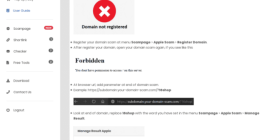Karma Catches Up to Global Phishing Service 16Shop
You’ve probably never heard of “16Shop,” but there’s a good chance someone using it has tried to phish you.
Last week, the international police organization INTERPOL said it had shuttered the notorious 16Shop, a popular phishing-as-a-service platform launched in 2017 that made it simple for even complete novices to conduct complex and convincing phishing scams. INTERPOL said authorities in Indonesia arrested the 21-year-old proprietor and one of his alleged facilitators, and that a third suspect was apprehended in Japan.






